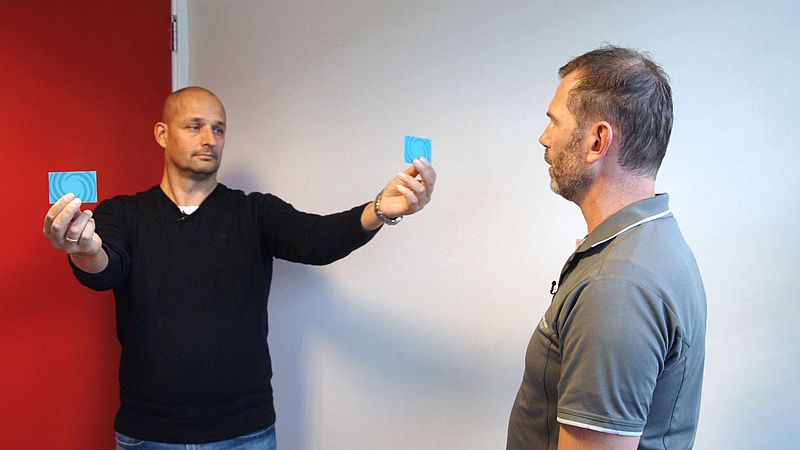Hans (49) was sitting on the sofa when suddenly it started spinning in his head. The dizziness lasted for months. Until, after a long search, he found a specialized physiotherapist: “The simplicity of the treatment amazed me”.
“I really had a hard time swinging like I was drunk.” Hans Venerius still can’t believe how his body suddenly disappointed him, now a year ago “All my stability was gone and it’s scary. It’s like something has happened in your head, like something has broken.”
vertigo
He thinks for a moment about the worst, a brain tumor for example, but his doctor immediately reassures him over the phone. It will be dizziness, perhaps as a result of the crown.
Two weeks later Hans is still feeling just as bad. He goes to his doctor. She does a tilt-and-turn exercise with him, which confirms her in the diagnosis. A physiotherapist then helps him with exercises against dizziness, but unfortunately: Hans will not feel better.
Quite gloomy
When three months later he visits a throat, nose and ear doctor, it turns out he has inflammation of his vestibular system. “The ENT doctor immediately thought of a virus and inflammation and tested it. It turned out I had 100 percent acute failure on my left side.”
The ENT doctor told Hans that he had to move a lot, otherwise there was little to do. “In the meantime we were already months ahead. I was back to work, but it took a lot of effort to walk straight. If I don’t fix my eyes on one point, I have a detour to the left. It took so much energy that I was tired in the evening and I had a little more fun. I became rather gloomy. “
see also
“For 80 percent of my life back”
Through a colleague of his wife, Hans learns of a therapy in Hengelo by two physiotherapists who had started a center for vertigo. “Actually, I didn’t really believe it, but I made an appointment anyway.”
And it seems to help: “First they gave me a very simple grip and exercises to stabilize my gaze, which means you can train your eyes to stay balanced better. The simplicity surprised me. After arriving four or five times, I got 80 percent of my life back. “
10 percent suffer from vertigo
Last May, physiotherapists Mike Hilverink and Jeroen Wesselkamp started Dizziness Therapy Twente. They work together with ENT doctors from Almelo’s ZGT hospital. Apparently there is a need for the vertigo center, because they have already treated more than 200 patients with vertigo.
That number doesn’t surprise Mike Hilverink. “About 10 percent of the population suffers from vertigo. We think there is not enough knowledge about treatment options at the moment. And that’s what we want to make sure it’s visible for this region.”
View the report on Hans’s story and his vertigo treatment
Long waiting times
According to Hilverink, we shouldn’t underestimate the impact dizziness can have. “The harder it lasts, the more fear takes over. People can even develop anxiety disorders.” That is why it is also important that patients can be treated quickly.
And this is not always possible, there are dizziness centers with long waiting times. “It can’t be that someone has to wait a year for a decent diagnosis. We think it’s important that people end up in an intermediate stage at an earlier stage or at least be heard in their complaints. And then we may already start with therapy.”
More practitioners
Tjasse Bruintjes is an appointment professor of ENT at the University of Leiden and also works as an ENT doctor at the Apeldoorns Dizziness Center, the national center of expertise in the field of vertigo. He also sees that waiting times are often long. “We see around 1,000 new patients a year with us in Apeldoorn and the waiting time is one year.”
Bruintjes is convinced that there will be more therapists. “25 years ago it wasn’t very hot. Now you see a proliferation of clinics and treatment routes. I don’t mean that in a negative way, it’s great for the dizzy patient. It’s been a neglected group for a long time.” But he warns: “People can make an appointment with a physiotherapist without a referral, I wouldn’t do it if they feel dizzy. It is advisable to consult a specialist first to get clarity on what exactly is going on.”
see also
Shame
Hans has not yet completely rid himself of his vertigo symptoms. If he walks with his eyes closed, he has a significant deviation to the left, while he himself thinks he is walking straight. But the fixation exercises help him tremendously and that’s a relief. “There was also shame. I had a lot of trouble swinging like I’m drunk. It’s not cool when zigzagging. It has an obstructive effect, I don’t feel well.”
Now he walks much better when he concentrates well. And this feels like a world of difference. “My self-confidence, my enjoyment of life and quality of life have really improved a lot thanks to the very simple handles I have been given.”


